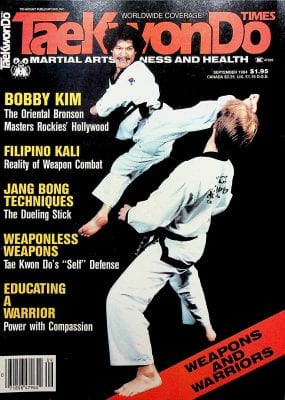With Timothy Cotter
Article originally featured in September 1984 Issue #12
From a neighborhood where violent gangs prowled the streets of Seoul, Korea, this modern-day warrior has fought for his dreams and is making them all come true.
I was delighted to have the opportunity to interview Bobby Kim-martial artist, film star and fellow Denverite. I had screened his latest film, “Manchurian Avenger” through the courtesy of the film’s producers and was anxious to interview in person, the dynamic man that I had just seen on the screen.
T. COTTER:
Mr. Kim, I know you are very busy and I couldn’t help but wonder how you still manage to teach Tae Kwon Do?
BOBBY KIM:
I have always loved to teach and I make the time. I’ve seen Tae Kwon Do change people. I’ve seen kids develop confidence, and because of the confidence, their self-image became better, and they became better people in general.
T.C.:
Do you feel that Tae Kwon Do has influenced your life?
B.K.:
Tae Kwon Do is a large part of my life and has been for many years. I grew up in Seoul, Korea. My father had been killed in the war, and one brother and one sister were also killed. It was a very bad time. I was a young boy of fourteen, small
for my age, and had no one to .protect me from some of the violent gangs that prowled my neighborhood. It was at that time that I began to study Tae Kwon Do with a wonderful old master. Within three years I had attained the black belt rank and none of the kids in the neighborhood bullied me or my family.
T.C.:
What were your goals after you earned your black belt?
B.K.:
Well, I wanted to go to the Korean Military Academy which is equivalent to America’s West Point, and someday be a general in the Army. I passed all the tests, but my eyes were not good and I was not accepted into the academy. I was very disappointed-it was then I decided to be in films.
T.C.:
What made you think that you had the talent to be in films?
B.K.:
Well, in studying Tae Kwon Do, I learned that through concentration and hard work, I could do what I wanted and be who I wanted to be. 1 learned to never give up.
T.C.:
How did you begin your acting career?
B.K.:
First, I enrolled in college to study English. I attended Woo Suk University which is now Korea University. I paid for my education by teaching Tae Kwon Do to the soldiers of the Seventh Infantry Division. Even with this work, it was difficult to help my family and pay for my education, so, in 1967, I trained very hard and competed in the Korean National tournament. I won a gold medal, but most importantly, I won an athletic scholarship to the University I was attending. I graduated in 1968.
T.C.:
What brought you to the U.S.?
B.K.:
(Laughing) An airplane. Well, I made friends from the Seventh Infantry and they suggested that I should come here. So, in January, 1969, I left Korea for a job in Orlando, Florida. When I arrived I was both amazed at this new land and sad because I missed my homeland. For two months I ate nothing but chicken-nothing. There were no Koreans or Korean restaurants in Orlando and chicken was all that I could cook. Finally-after two months of chicken, I moved to Washington D.C. where my sister was living. I’ve never eaten chicken since I left Orlando and I doubt I ever will!
T.C.:
How did you like Washington D.C.?
B.K.:
Washington was much better for me because it is a very international city. I opened my own school with the help of my friends. I met Bruce Lee in Washington.
T.C.:
Was Bruce Lee a famous film star at that time?
B.K.:
No, not at that time. Bruce had been in some films, but he was primarily interested in the martial arts. He came to my school and we talked for many hours about fighting styles and techniques. He was a very talented man and we became friends and trained together. He was an inspiration for me ‘as an actor, and I was very sad when he died.
T.C.:
Why did you leave Washington and move to Denver?
B.K.:
I had a friend, Chuck Sereff, who since then has become a very successful competitor in the martial arts. He is a very talented martial artist and is also in our picture, “Manchurian Avenger”. Most importantly, he is my good friend. Anyway, Chuck was starting a school in Denver and he asked me if I would come and teach at his dojang. He came to Washington and we drove together to Denver.
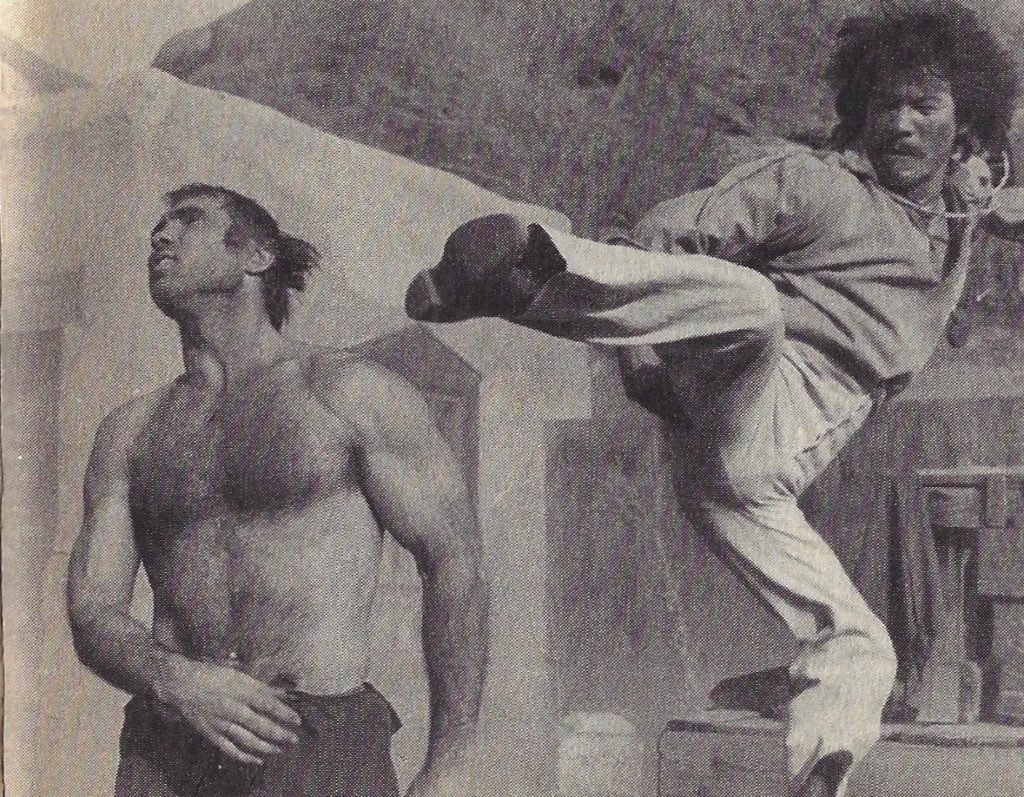
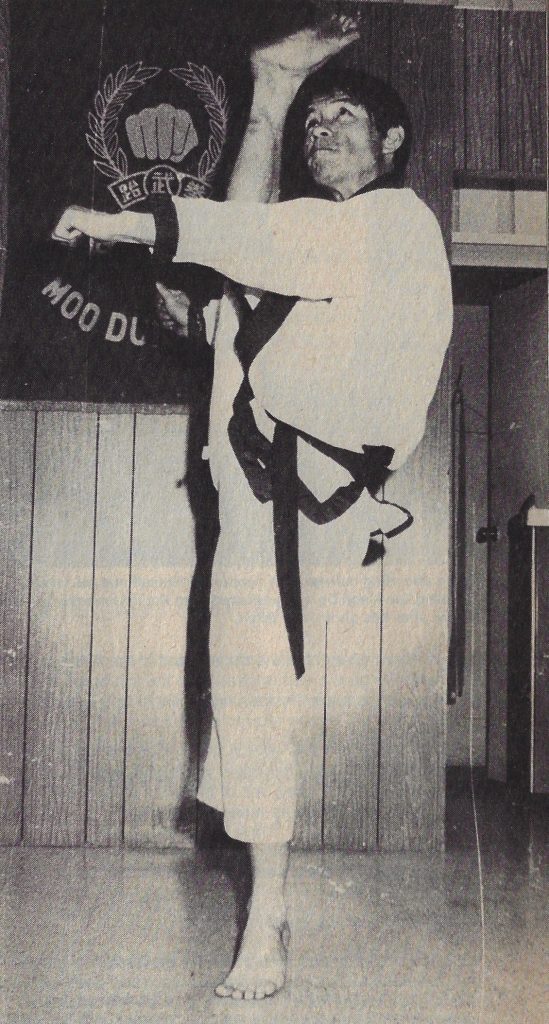
T.C.:
That’s a two thousand mile drive, did you enjoy the trip?
B.K.:
I was just amazed! We drove and drove and the land always rolled on in front of us. It was only then that I realized how large and rich this land was-I mean the industry and the large farms. I had never seen things on such a large scale and it just went on and on. After many hours crossing the plains, I could see the Rocky Mountains, a hundred miles away on the horizon in front of us. Two hours later, we stopped on the outskirts of Denver and I looked at the mountains. It was similar to my homeland of Korea, but the mountains here were so much higher.
T.C.:
What were your impressions of Denver once you began teaching here?
B.K.:
I liked Denver. Chuck and I taught constantly. I would drive seven hundred miles a week teaching. That’s over half-way across Korea. I taught at the dojang and at the Air Force Academy. We gave a demonstration to the top brass and they decided to make the training available to the cadets.
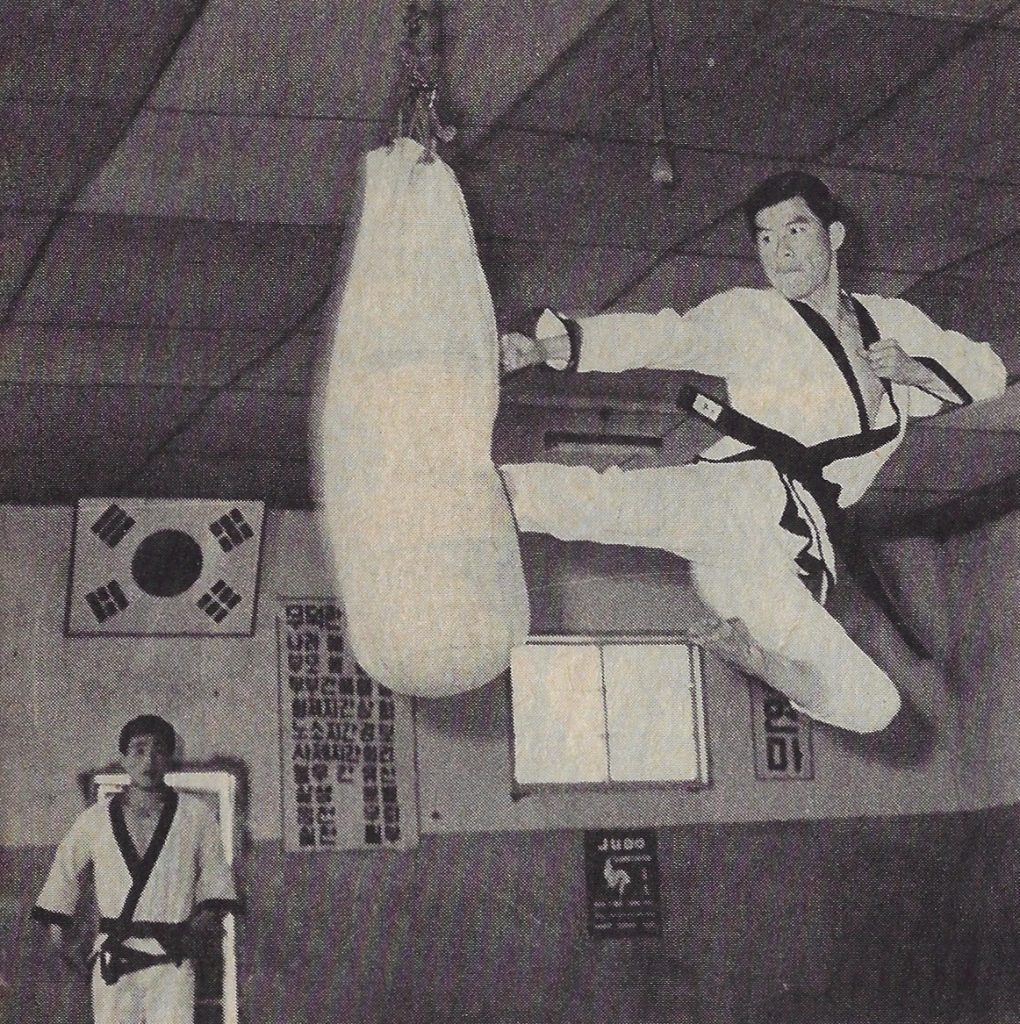
T.C.:
It’s ironic that when you were young you wanted to attend a military academy and after many years, you were teaching at the Air Force Academy, one of the U.S’.s most prestigious training grounds for future military leaders.
B.K.:
I never thought of it that way. I enjoyed teaching those men and they were excellent students. I want my son to go there.
T.C.:
Where else have you taught in Denver?
B.K.:
Well, Chuck Sereff and I taught at the University of Denver, the University of Colorado at Denver, Colorado State University, the Denver Police Academy and the Aurora Police Academy. These were exciting times for me because we were bringing Tae Kwon Do, an ancient art which is the national sport of Korea-to this new country, and the U.S. loved Tae Kwon Do.
T.C.:
It sounds as though you were very busy at that time. Had you forgotten your goal of having a movie career?
B.K.:
No. I always knew my opportunity would come, but I was so excited about this new country and all the good people I was meeting and I was learning so much that becomming a “star” was secondary. But then something happened to put me back on the track to being in films. I was chosen as a coach for the American team at the first Tae Kwon Do Championships in Korea. At that time, my brother, Richard, was a very well respected, award winning screenplay writer in Korea. When I went to Korea for the Championships, he introduced me to Tai Soo Kim, who was then President of the Tai Chang Entertainment Company, and is now in politics in Korea. Tai Soo Kim was making a motion picture entitled, “Showdown of Death”, and had heard about me from my brother, Richard. They did a screen test and decided I should star in the picture.
TC.:
Was the picture successful?
B.K.:
“Showdown of Death” was very successful and made a lot of money. After that, I was asked to perform in ten more pictures with Tai Chang Entertainment; I agreed to do four more. After finishing those films, I did another five for various companies in Hong Kong and Indonesia. Then-I was tired, I needed a rest. I had been in ten pictures in six years which is a lot of work. I had traveled perhaps twenty times between the U.S. and the Orient during this time. I was offered a part in a picture with Robert Vaughn, who was very popular in the U.S. from his role in the TV series, “Man from UNCLE”. Keenan Wynn was another star in this picture which was called, “Lucifer Complex”. From this experience, I learned the difference between Eastern and Western made pictures. You know, America has lost its prominence in some fields, like auto manufacture, but throughout the world, America is the premier filmmaker.
T.C.:
At this point you had made pictures in Korea, Hong Kong, Indonesia and the U.S. What was your next goal?
B.K.:
My brother, Richard, and I wanted to make an “Americanmade” martial arts picture. He had written a good story and we began contracting film production companies. Based upon our experie-nce in films made in other countries, we estimated that the budget to make a film from Richard’s story would be between one hundred and fifty to two hundred thousand dollars. We found that to make an American-made movie, we would need over one and one half million dollars.
T.C.:
I just watched your latest film, “Manchurian Avenger”, and I must say it’s one of the most exciting and realistic martial art films I’ve ever seen. Why are the fight scenes so much better in your film than in other martial art films?
B.K.:
I as in charge of selecting the people to act in the fight scenes. I wanted people that had extensive martial arts training.
TC.:
Why?
B.K.:
For realism and safety. The fight scenes required perfect timing and choreography. That kind of required discipline can best be learned through training in the martial arts. Each of the “Four Winds”, the villians I fought in “Manchurian Avenger”, is a black belt. Song Ki Chon is a talented point fighter and full contact competitor. Karl Nicoletti is a black belt and a fantastic kicker. Larry Sheperd is a well known and powerful full-contact competitor. Richard Ochiuzzo is also a black belt; we call him “Mad Dog”.

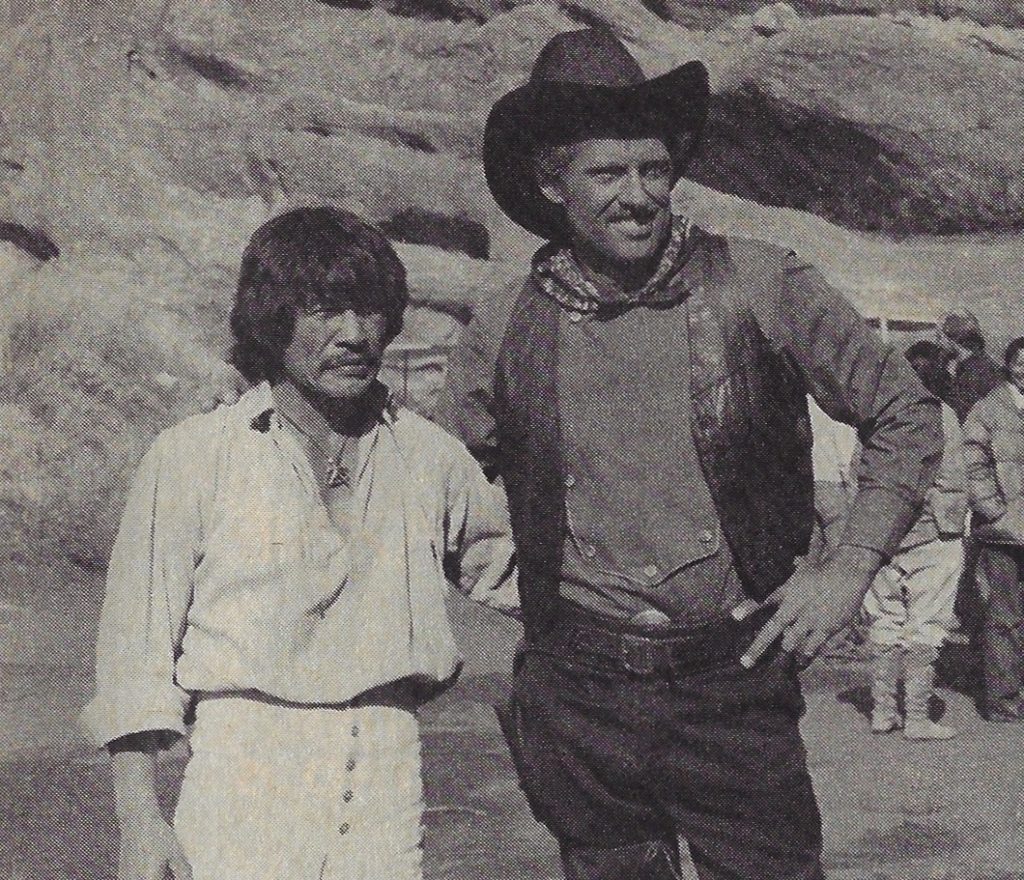
TC.:
And Bill Wallace?
B.K.:
Yes, Bill Wallace plays the leader of the Four Winds. Bill is an extremely talented individual. Rrst, he is a black belt and undefeated world champion fighter and additionally, he is an experienced actor through his _work with Chuck Norris. Bill and I worked closely in order to get the realism you mentioned in the fight scenes. His help was very valuable.
It is very expensive to create the quality you see on the screen in “Manchurian Avenger”. The film is set in different time, which you must recreate. That means costumes, sets, locations, et cetera, et cetera … It’s a heavy action picture which means shooting the shot from several angles and then picking the best in the editing. Also, we custom-made the sound of each and every punch and kick in the film. We tested different sounds searching for what sounded real. When you saw the film you didn’t notice this, but you feel it-that’s what makes the picture exciting.
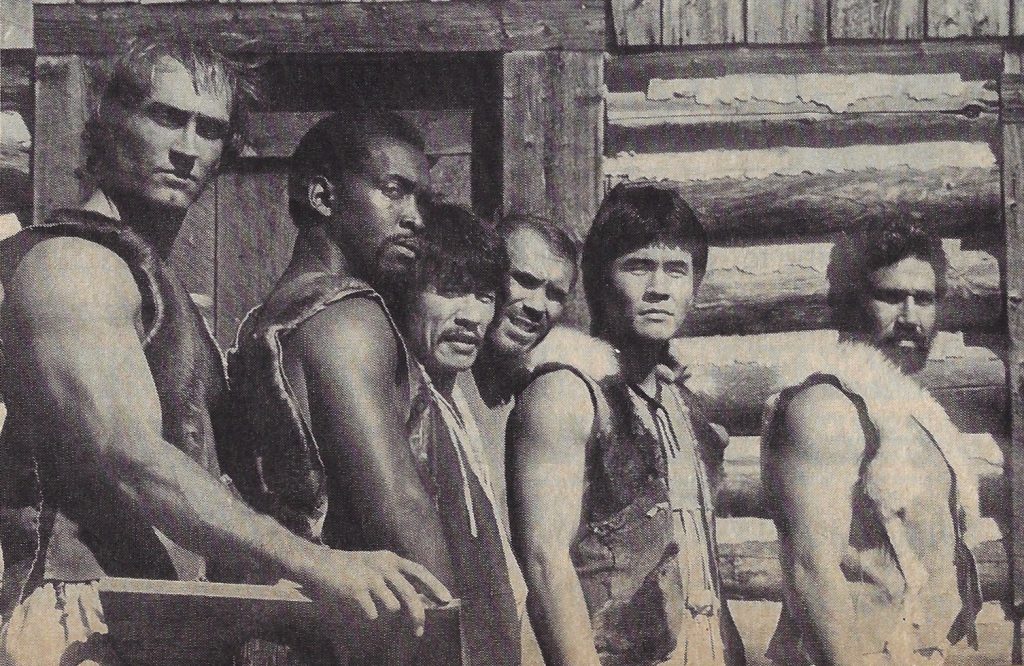
T.C.:
“Manchurian Avenger” will be released this summer; do you have plans for another film?
B.K.:
We have several projects we’re working on right now. The
next picture is entitled, “Black Mountain Fury” and we’re finalizing plans for that production in the near future. It’s an ambitious project, the- most exciting film yet!
T.C.:
Could you divulge a little of the plot of “Black Mountain Fury”?
B.K.:
Well, its a contemporary piece that takes place in New Mexico, San Francisco and Chicago. Its theme is good versus evilyou’ll have to see the film to find out the rest, but it’s a very good story.
T.C.:
If you could have any actor that you wanted in Black Mountain Fury, who would you choose?
B.K.:
Charles Bronson, I really admire him. I alsQ think that Lee Van Cleef is a very, very fine actor.
T.C.:
Has anyone ever told you that you resemble Charles Bronson?
B.K.:
Oh,. yes! Many people have told me that.
T.C.:
What do you hope to accomplish in the next ten years?
B.K.:
I want to succeed in martial art pictures as an actor and as a producer. I was executive producer on the “Avenger”. I also want to learn to speak English more fluently. Being born in another country handicaps me in my film career, but I keep trying to improve my English and I’m not giving up!
T.C.:
Do you ever plan to return to Korea?
B.K.:
When I am an old man I want to return to Korea and do something for my homeland. I don’t know what I’ll do, but it will be something to help my countrymen.
T.C.:
How do you hope to be remembered?
B.K.:
You know, an animal leaves his skin, but a human being leaves only his name and reputation. I am working very hard to be remembered as a good actor and a good martial artist. If people think those things of me, I will be happy with the way I lived my life.
